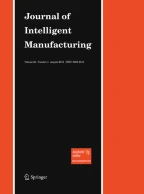Abstract
In this paper, we describe our development of a fully integrated manufacturing planning assistant (IMPA) system, which is able to: (1) interpret the finished part requirements directly from the designer's CAD systems or solid modelers without user intervention or special feature coding; (2) check the machinability of a designed part; (3) automatically generate a process plan, a tool path and an NC (numerically controlled) code, and (4) support interactive user modification of the resulting plans, tool paths and NC code. A demonstration version of the system was designed to provide automated assistance for the planning of machining processes on three-axes NC machine tools. The underlying architectural concepts and reasoning algorithms can be extended to more complex machines such as four-or-more-axes NC machines. CAD, CAE, and CAM including robotic, FMS (flexible manufacturing system) and NC machines are widely used in industry today. There is increasing interest in automation of factory control software Merchant, (1988); this includes automating the generation of the control programs — that is, in developing systems which will automatically produce the NC code for machining the part, given a model of the part, the shape of the raw material, and the machine specifications. With such systems, there are several difficulties in the manual preparation of an NC program code such as, long and tedious calculations, high risk of error in data preparation, etc., which need to be eliminated. This is a critical step toward the integration of CAD and CAM into a truly concurrent engineering and manufacturing environment.
Similar content being viewed by others
References
Armstrong, G. T., Carey, C. and Pennington, A. (1985) Numerical code generation from a geometric modeling system, inSolid Modeling by Computers: From Theory to Applications, Pickett, M. S. and Boyse, J. (eds), Plenum Press, New York, pp. 139–54.
CAMI (1988) Shah, J., Sreevalson, P., Rogers, M., Billo, R. and Mathew, A., Current status of features technology, inRevised Report, R-88-GM-04.1.
Chand, D. R. and Kapur, S. S. (1970) An algorithm for convex polytopes.JACM,17, 78–86.
Chang, T. C. and Wysk, R. (1985)An Introduction to Automated Process Planning Systems, Prentice Hall, Englewood Cliffs, New Jersey, pp. 216–23.
Chen, S. C. and Voelcker, H. B. (1986) An introduction to MPL: a new machining process/programming language, inProceedings IEEE International Conference on Robotics and Automation, San Francisco,1, pp. 333–44.
De Floriani, L. (1989) Feature extraction from boundary models of three dimensional objects.IEEE Transactions on Pattern Analysis and Machine Intelligence,11, 785–98.
Henderson, M. R. (1984) Extraction of feature information from three dimensional CAD data, PhD Dissertation, Purdue University, Lafayette, Indiana.
Henderson, M. R. (1985) Extraction and organization of form features, inProceedings of Prolamat, Elsevier Science Publishing Inc: New York, pp. 131–41.
Kypriano, L. K. (1980) Shape classification in computer aided design, PhD Dissertation, University of Cambridge, UK.
Merchant, M. E. (1988) State of the art and trends towards computer integrated manufacturing, inSoftware for Discrete Manufacturing, Kochan, D. and Olling, G. (eds), Elsevier Science Publishing Inc; New York, pp. 25–53.
Parkinson, A. (1986) The use of solid models in BUILD as a database for NC machining, inSoftware for Discrete Manufacturing, Crestin, J. P. and McWaters, J. F. (eds), Elsevier Science Publishing Inc., New York, pp. 175–83.
Requicha, A. A. G. and Vandenbrande, J. (1988) Automated systems for process planning and part programming, inArtificial Intelligence Implications for CIM, Kusiak A. (ed.), Springer-Verlag, Heidelberg, pp. 299–326.
Shah, J. J. and Rogers, M. T. (1988) Expert form feature modeling shell.Journal of Computer Aided Design,20, 515–24.
Vanderbrande, J. and Requicha, A. A. G. (1990) Spatial reasoning for automatic recognition of interacting from features.ASME International Computers in Engineering Conference, Boston, Massachusetts, pp. 110–22.
Woo, T. C. (1982) Feature extraction by volume decomposition, inProceedings of the Conference on CAD/CAM Technology and Mechanical Engineering, Cambridge, Massachusetts, pp. 76–94.
Author information
Authors and Affiliations
Rights and permissions
About this article
Cite this article
Mayer, R.J., Su, CJ. & Keen, A.K. An integrated manufacturing planning assistant — IMPA. J Intell Manuf 3, 109–122 (1992). https://doi.org/10.1007/BF01474750
Received:
Accepted:
Issue Date:
DOI: https://doi.org/10.1007/BF01474750
